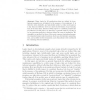Free Online Productivity Tools
i2Speak
i2Symbol
i2OCR
iTex2Img
iWeb2Print
iWeb2Shot
i2Type
iPdf2Split
iPdf2Merge
i2Bopomofo
i2Arabic
i2Style
i2Image
i2PDF
iLatex2Rtf
Sci2ools
109
click to vote
JELIA
2010
Springer
2010
Springer
Similarity-Based Inconsistency-Tolerant Logics
Abstract. Many logics for AI applications that are defined by denotational semantics are trivialized in the presence of inconsistency. It is therefore often desirable, and practically useful, to refine such logics in a way that inconsistency does not cause the derivation of any formula, and, at the same time, inferences with respect to consistent premises are not affected. In this paper, we introduce a general method of doing so by incorporating preference relations defined in terms of similarities. We exemplify our method for three of the most common denotational semantics (standard many-valued matrices, their non-deterministic generalization, and possible worlds semantics), and demonstrate their usefulness for reasoning with inconsistency.
Artificial Intelligence | Common Denotational Semantics | Denotational Semantics | Inconsistency | JELIA 2010 |
Related Content
| Added | 28 Jan 2011 |
| Updated | 28 Jan 2011 |
| Type | Journal |
| Year | 2010 |
| Where | JELIA |
| Authors | Ofer Arieli, Anna Zamansky |
Comments (0)

